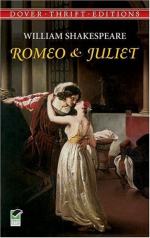|
This section contains 7,011 words (approx. 24 pages at 300 words per page) |

|
SOURCE: Waters, D. Douglas. “Fate and Fortune in Romeo and Juliet.” Upstart Crow 12 (1992): 74-90.
In the following essay, Waters contends that Romeo and Juliet is a tragedy of fate and fortune influenced by the writings of Ptolemy and Seneca.
In critical discussion of Romeo and Juliet in the last three decades or so, there are at least three significant ways of approaching the play: 1) traditional character-study as the key to the tragedy, 2) a recent de-emphasis on the genre of tragedy in favor of discussion of culture, sexual difference, and ideology, and 3) the role of fate as the key to the tragedy. The complexity of these issues necessitates clarification of my own critical stance. First, I think the character-study critics have overemphasized the study of character in this play, but not because I think, as Christopher Norris writes in “Post-Structuralist Shakespeare: Text and Ideology” (1985), that character-study in itself is...
|
This section contains 7,011 words (approx. 24 pages at 300 words per page) |

|


